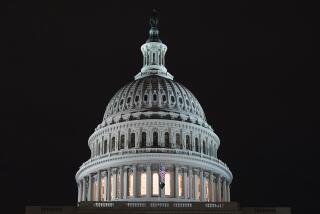Accord Reached on Aid Package for Urban Areas
- Share via
WASHINGTON — The White House and bipartisan House leaders reached agreement Wednesday night on a long-term urban aid package that includes enterprise zones, a reduction in the capital gains tax for those investing in the zones and $2.5 billion in spending over five years.
The package emerged from nearly two months of intense negotiations between House Majority Leader Richard A. Gephardt (D-Mo.) and Administration officials after the Los Angeles riots.
“This is not the millennium in urban policy, but it’s a step in the right direction and it’s a worthy experiment,” Gephardt told reporters in announcing details of the plan.
A White House official who took part in the talks said: “The Administration thinks this is a very positive compromise, taken as a whole.”
Although President Bush and congressional leaders have made passage of an urban aid package before the national political conventions a high priority, there is widespread criticism of the measures among rank-and-file Democrats and Republicans.
Some believe the proposals, especially the enterprise zones, will do little to alleviate the crime, poverty and drugs that plague major urban centers. Others, from suburban and rural areas, are opposed to spending billions to help large cities. Still others disagree with the mix of tax incentives in the package.
Gephardt conceded that House leaders may have difficulty today in passing the bill, which will be grafted onto a $14.5-billion omnibus tax bill, because of their decision to seek passage under a suspension of the rules, which requires a two-thirds majority instead of a simple majority.
This approach was made necessary after a group of Democratic members vowed to oppose a rule bringing up the enterprise legislation unless they were assured of a vote this year on an unrelated issue, the “notch baby” Social Security controversy.
Earlier this month, Congress passed a $1-billion emergency spending bill, providing $500 million for summer jobs for young people and the rest to finance small business loans and emergency grants for Los Angeles and Chicago, where the downtown area was flooded a few months ago.
At Bush’s insistence, the centerpiece of the package is the enterprise zones, which provide tax incentives to businesses that invest in blighted areas. Also prominent is a capital gains provision more generous to zone investors than the Democrats favored.
A total of 50 enterprise zones, evenly distributed between urban and rural areas, would be designated, at a cost of $2.5 billion over the next five years. Under the agreement, 50% of the capital gains from sale of an interest in a business located in an enterprise zone would be excluded from the tax, provided that the investment was held at least five years.
More to Read
Get the L.A. Times Politics newsletter
Deeply reported insights into legislation, politics and policy from Sacramento, Washington and beyond. In your inbox twice per week.
You may occasionally receive promotional content from the Los Angeles Times.









